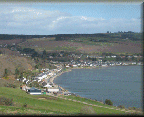In spite of the 1872 Act, making school compulsory for all children aged between 5 and 13, non-attendance was still common in the early 1900s. In 1905, an attendance officer was appointed to report to the school board monthly with a list of defaulters. In Avoch, the attendance officer could be seen once or twice a week rounding up the truants, sometimes carrying them back to school on his shoulders.
The way of life in Avoch affected the attendance at school. With father away at the fishing, mother often had to bring up a large family virtually on her own, so that any help from older children was important to her when she was unwell, when it was wash day, or when another baby arrived. In 1905, a case is recorded of a girl attending school for the first time in 2 years! One ex-pupil remembers other girls bringing “babes in arms” to school so that mother could get on with her work. It was very common in Avoch for pupils to take Friday afternoon off.
Schooling was also affected in the summer when whole families would move with their boats to Fraserburgh and Peterhead for the fishing. There were also noticeable differences in the attendances of the farming community, when farm servants moved to different areas depending on the season. Help was particularly sought at potato lifting time and in 1916 it was agreed to close the school for 2 weeks during October for this purpose.
When a child did not attend school for some time, the parents would be summoned before the School Board to give some reason for this. Many different excuses were put forward by parents and unless there was a medical reason (when a certificate by a doctor was needed) parents could be prosecuted if the truancy continued. In 1911 a case is recorded of an Avoch parent being prosecuted and required to pay £1 1/-.
Records were broken for Avoch Public School in 1929 when the school achieved perfect attendance for the first time. In 1961 attendance records state that one of the Avoch pupils had achieved 10 years of perfect attendance.
In certain cases part exemptions were granted from attending school. Exemptions were given to children whose mothers were dead or ill (a medical certificate had to be provided), especially when the father was at sea. Exemptions were also given to children who helped on their father’s farm during the winter, but they had to attend during Spring, Summer and Autumn.
